Cucumber Salad #19: Life updates
This is the first edition of a 1/2 series on Living in Tokyō, describing a little bit about my experience of living in Japan for the last 5 months.
I have been meaning to write this newsletter for a couple months now, and in some ways I feel sad I delayed the registration of so many interesting things that happened, but in others I am happy to have a more solid and coherent amount of information to discuss.
Why did I disappear from social media
On late 2024 I have taken the much delayed decision of seriously committing to quit regularly accessing instagram. Since then, I have deleted the app and never looked back. I still check messages once every ~3 weeks if I remember to.
Many people who I have mentioned this decision to were very discouraging and told me I wouldn't be able to quit instagram, some mentioned they had tried and didn't last for more than a few weeks. I didn't put much pressure on myself to keep on with the idea, but I was excited about the perspective of not spending a significant amount of my time on this earth looking at – mostly – nonsensical "content" and ultimately just working for mark zuckerberg for free. Ultimately I just felt like I craved more from life, and unlike a lot of other factors, this one was a choice up to me.
Unsusprinsingly, I quickly started to fill my time with other types or noble activities, like micromanaging house work, talking to friends and family. The impulse to check the phone for notifications still persisted, but I was reducing my phone screen time dramatically.
I reorganised my apps to use the phone more as a tool than a source of entertainment. That means keeping apps for texting, researching, browsing, translating and conversions, bookeeping etc. but deleting streaming, games, social media etc. This way I gradually internalised that the amount of activities I would be able to execute on my phone was very useful, but also very limited, and that if I wanted to spend time looking at a screen I needed to search for a desktop, tablet or a tv.
Weeks were going by and I mostly didn't think about instagram at all. I started to get a sense that if I visited my timeline I would be trapped in an elusive paranoid dimension where I constantly had to prove to people that my life was one worth living, while contradicting this statement in itself by spending its valuable and finite time on instagram.
But despite not missing interacting with the platform at all, I missed keeping in touch with friends, learning about what they were up to, exchanging silly memes. And, unfortunately, letting an abyss grow between me and many people I really care for was a compromised I had to make.
On the few times I visited instagram since deleting the app from my phone, I was very happy to see updates from folks, see they're doing well or have achieved something important for them. It feels unfair that the cost to participate in these types of interactions is one too high for me to bear.
Even worse, it's dehumanising that the cost for sharing updates with people who you care for is by turning moments of your life into a less than insignificant amount data, its major function being that of robbing us from our right to autonomy and self determination.
I wonder what it is that the moments our lives symbolically become once they hit the feed. "Content", something even lower than nothing, the rockbottom of worthlessness. I feel a strong desire to share about my life with my friends, but I would feel terrible to transform my experiences into whatever it is that things goreishly morth into once they're rendered into the carefully dictated constraints of a Story.
“Ok, so what were you doing with your life by the end of 2024?”
TLDR;
Working (briefly 2 jobs)
Suffering under the heat
Helping my mother recover from a delicate eye surgery
Shopping for groceries regularly
Struggling with anxiety and hypomania
Vibing with Neneca and Edson
Preparing long trip to Japan
As 99.99% of the people reading this can imagine, I spent most of of my time doing ordinary things. I focused a lot on work, struggled with mental health, and bought some Korean skincare despite Haddad's best efforts.
As my mother successfully recovered from her eye surgery, I started to plan a long trip to Tokyo, where my partner and workmate T is currently living. As most international trip plannings go, it was a quite stressful project, but in December 11th I landed in Haneda after about 30h or traveling (~23h of those were flying).
Lessons learned from ridiculously long trip
Even thought I am no stranger to long international trips, this one took the most out of me and I arrived in Haneda ready to be thrown in the trash. These are a few things I have learned from this experience:
Layer like an onion because it could just as well be that GIG has no working air conditioners on the gate areas
Layer like an onion because it would as well be that JFK's heating is blasting. Also security is anxiety inducing there, so there will be sweat
Have deodorant accessible to you at all times on a carry-on bag
Apply deodorant to your foot soles
Bring extra underwear
Bring extra shirts
Bring extra socks
I can't stress this enough: BRING WET WIPES
If you're boarding on a flight longer than 12h, get an aisle seat even if you have to physically harm someone for it. You will need to stretch arms and legs frequently.
Early 2025
Tokyo first impressions
Starting this section with an apology, I feel like there are so many people who I have been seriously owing some life updates to. I truly feel joy from the interest people show in learning about what's up, and I struggle to keep up with all of the different channels I need to communicate with.
As I have started writing this newsletter on the 15th of February I am still alive and well in the Tokyo prefecture.
Before boarding on the plane to Japan I remember thinking "Going from Rio to Tokyo is going to be like Chico Bento going to a mall", but the truth it felt more like the monkeys from the prologue of Space Odyssey going to a mall.
The cultural shock I felt arriving in Japan was by far the most disorienting one I have ever experienced. I was suddenly hit by the fact that during my entire life I had never been in a territory that wasn't either European or a former European colony, and as a consequence, I often didn't have a solid cultural or contextual ground to stand on when I needed to understand situations or interact with people.
Tokyo is a quite oppressive place in some ways and you can feel it in the "vibe". In Japanese culture, many of the most ordinary everyday dynamics follow specific procedures, etiquette behaviours and guidelines. Many of those are not said or written anywhere, and as a consequence, I felt very stressed getting used to the mindset I needed to adopt in order to walk on the street or ride the train. There's a lot of bowing, a lot of smiling with your eyes and thanking others profusely.
The closer you get to the central areas of Tokyo the more people are rushing, and many times I found myself walking really quickly as well, luckily T would kindly remind me that we were not the ones tight on time. Sometimes the mass of people would be so dense we would be stuck in a traffic jam of bodies, all moving in the same direction. When this happens, its useless to rush or try to go in any other direction than the one everyone else is moving towards.
As expected, the more central areas of Tokyo like Shinjuku and Harajuku are extremely interesting places. Visually overwhelming, diverse, truly cosmopolitan, but as any other global touristic area in the world, it also feels culturally deteriorated, gentrified and a bit scammy at times.
That being said, I have had a lot of fun visiting the most central areas of Tokyo. For once, the train stations are mazes, so large and complex to navigate through. I know my way around some of them now, but It's very important to pay a lot of attention to where I am going at all times. If I spend 2 seconds looking at my phone I could lose an exit. Sometimes a train arrives on a platform and the flow of people coming from it is so dense that I basically need to physically fight that mass of bodies to be able to climb the stairs. This also happens when crossing the streets, specially in Shibuya, where it looks like theres an army of people waiting to cross the street from the other side. If you don't know where you're going, you're going to get carried away.
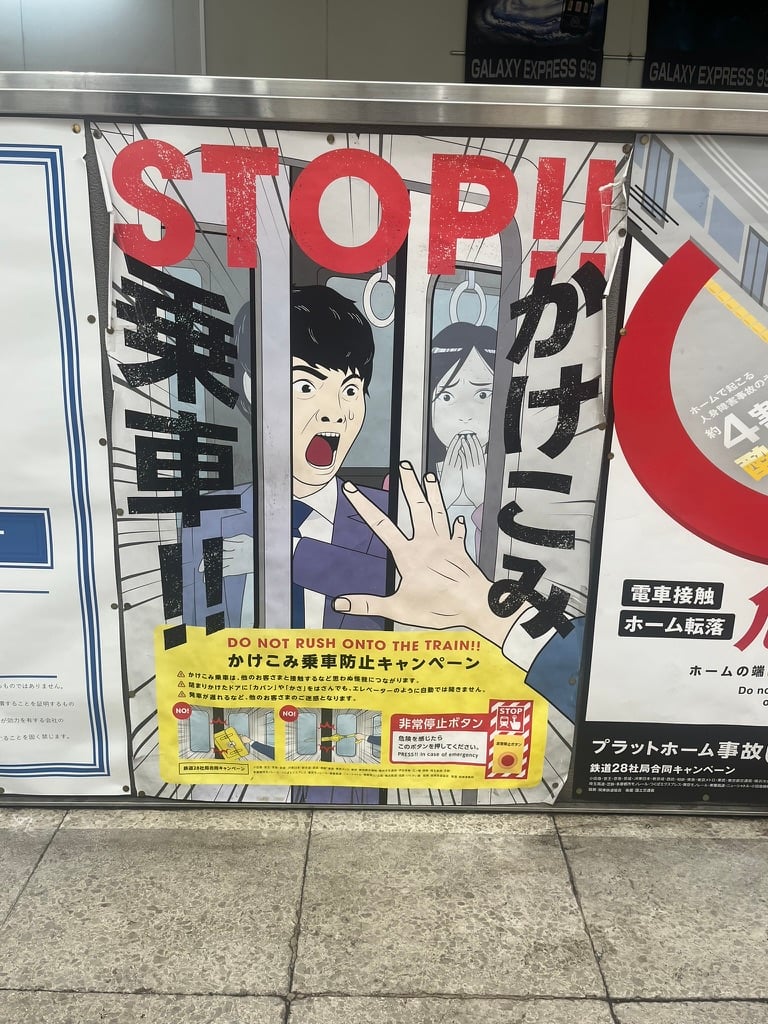
I found Shibuya the area that somehow still keeps a stronger sense of geniune-ness to itself, some parts of it feel truly "cool" and there are some people who really seem just be doing their own thing. In fact, there are so many people in Tokyo who exercise such a strong sense of personal style, I felt nostalgic for my teenage years when I spent a lot of my online time browsing through street fashion blogs. The Sartorialist dream still lives on in here.
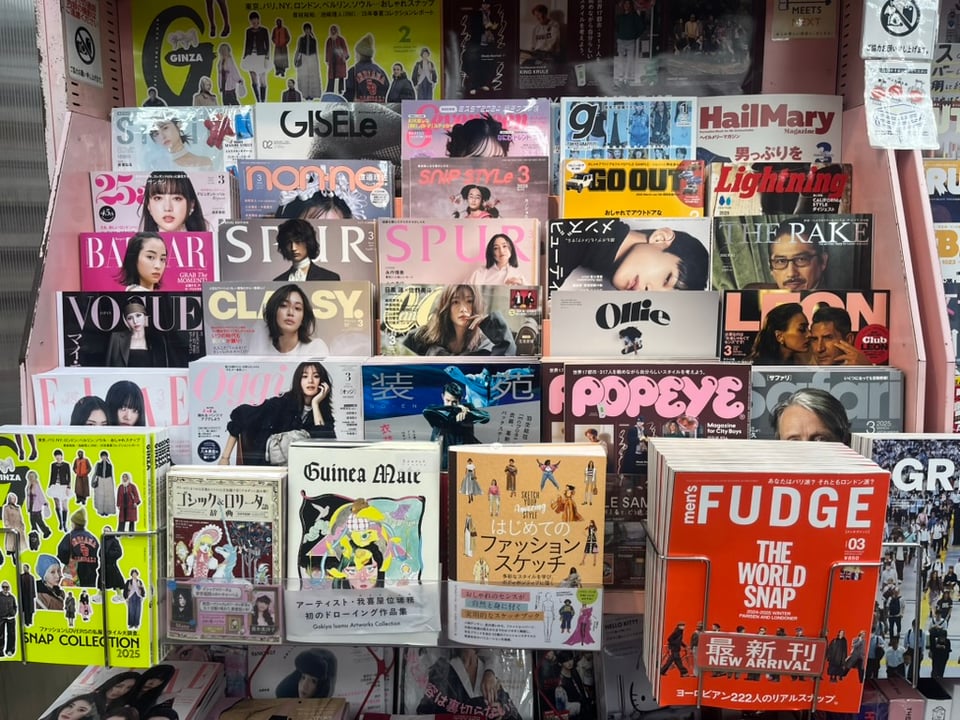
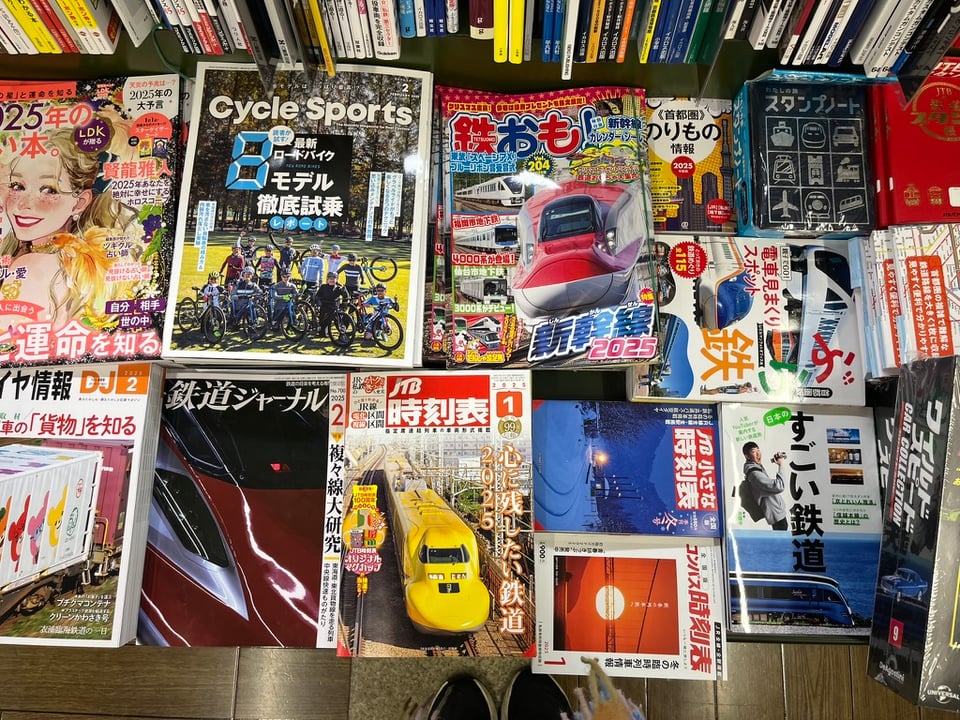
The experience of crossing The™ Shibuya crosswalk is very unique and intriguing. For once, there are so many crosswalks in Shibuya sometimes we think we're crossing The One™ but its actually a different one a bit further, so its quite disorienting in general.
When crossing Shibuya Crossing™ I look around and see countless and cameras filming me from all angles: some from the crossing itself, others from the station windows, and hundreds from panoramic views in the surrounding buildings. It reminds me of feeling overwhelmed on my birthday parties when I had to stand behind the cake and my family members would gather and take pictures from a bunch of different angles while I tried to hold a fake smile for as long as possible, except this time it's about 200 times more people taking pictures.
Many influencers and people trying to take more elaborated shots will make the crossing experience harder for everyone else by stopping in the middle of the street or running in front of the cars before the signage opens. It's quite chaotic and makes you think about the current state of surveillance. While I make my own personal choice to not share this moment of my life publicly, there will be other 300 people who will violate this choice without my consent.
The biggest attractions in central Tokyo are consumer activities. Malls merge into other malls, train stations turn into malls, a lot of times we have to be careful not to accidentally walk into a mall complex. There isn't a great variety of things to do outside or for free, specially in the winter.
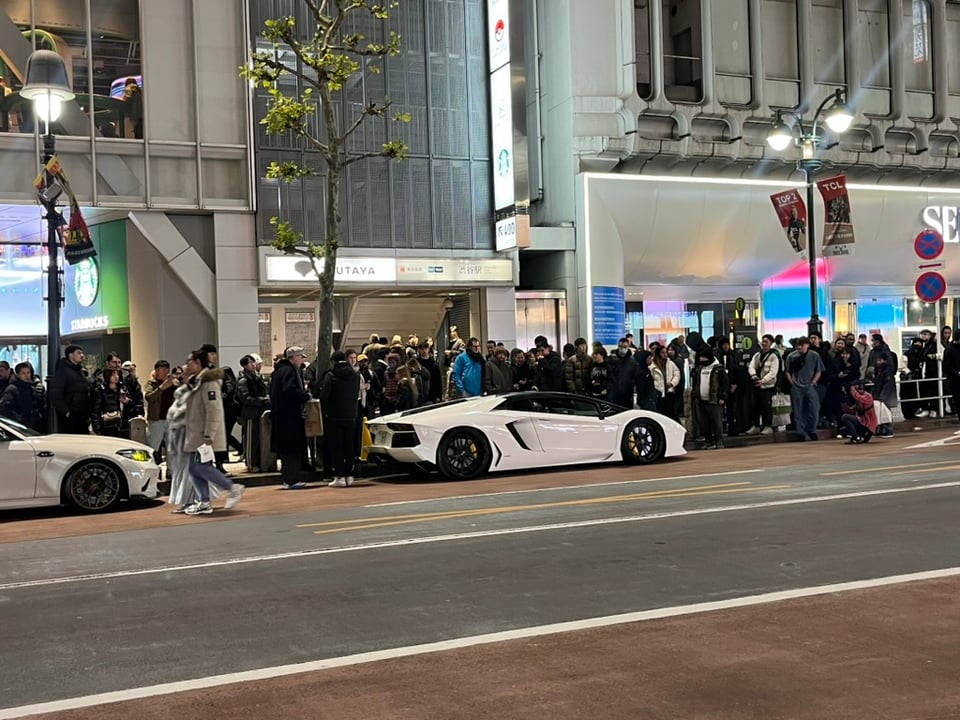
As much as I find it interesting to see what kinds of things are for sale, there's only a limited amount of money and patience that I can spend aimlessly visiting shops, specially the ones in touristic areas.
In contrast, we're staying in a medium-sized city that's well urbanised, most people in the area are Japanese, and very few service workers speak English. In fact we only know of about 3 who do. Most people won't speak a word of English, so I try to prepare translations in advance when I need to communicate something more complex by writing what I need in romaji, hiragana and also making illustrations if necessary.
That being said, in the majority of the occasions people are very helpful and seem to have empathy about the fact that I can't speak Japanese by making mimics or pointing at things. Some of them use the ancient resource of speaking LOUD Japanese, which isn't very helpful, but I appreciate the effort anyway.
Further from the main centers of Tokyo the pace of life changes in many ways. The biggest difference is the fact that the vast majority of the population is composed by elderly people, sometimes we feel like we're the younger people in a store by a range of about 40 years.
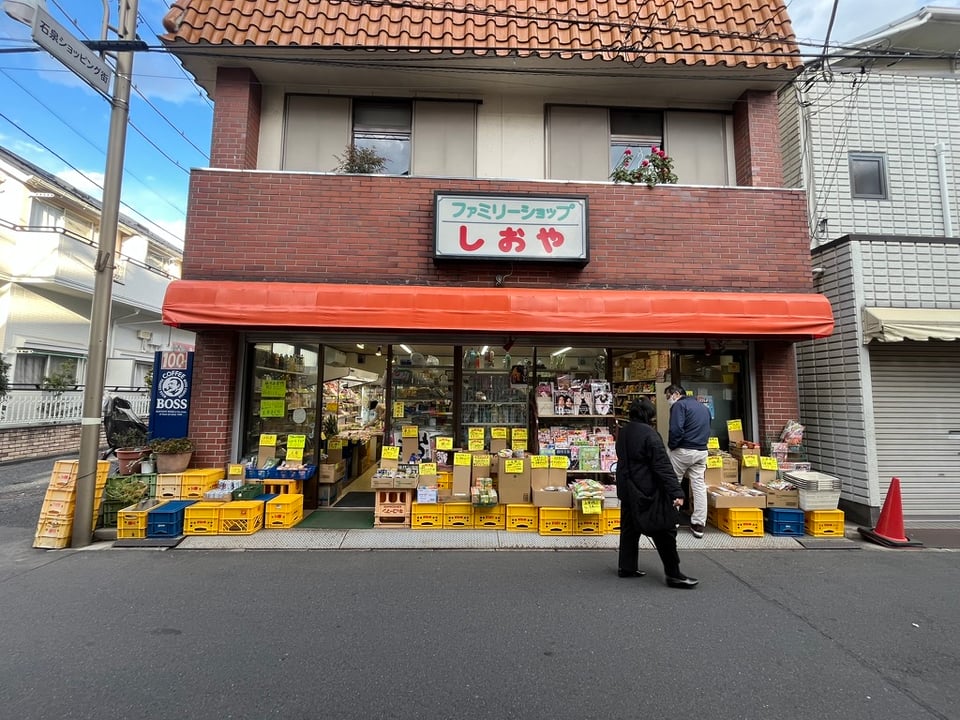
I like to pay attention to the change of faces when going from further from the centers of Tokyo to, say, Shibuya and how the majority of the people are very young once we get closer to the center.
The impact of the massive aging population in everyday life always brings some thoughts. Many services are adapted to prioritise their needs (some in quite comical ways, like escalators that are specially slow and have speakers screaming at you to hold on to the rails). There are very large sections dedicated to elderly care on drugstores and a variety of digital services is adapted to people with poor sight and hearing. In the drugstores, the elderly care sections are significantly larger than the baby care ones. Even the clothing stores aren't interested in their younger clients and most are targeting older folks. It also makes you pose the question "what the hell is going to happen to this place once these people die?"
Spending time in a smaller city has been insightful in many ways. And as the stars in my eyes became a bit less bright from the first impact of arriving in Japan, I started to pay attention to details of everyday life. How people behaved while doing their groceries, how they hung their laundry, how they pick produce at the farmer's market.
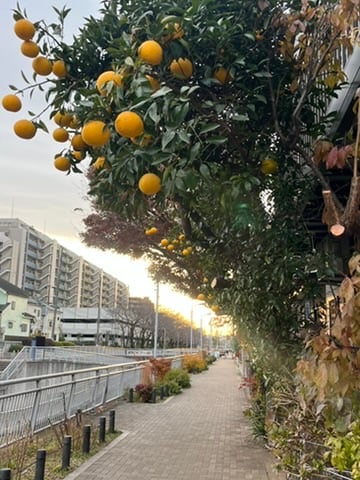
Japanese culture is riddled with micro-rituals. There's a strong approach to a "nothing is obvious" praxis in packagings and certain guides and tutorials where every process is explained in detail, and I got interested in translating everything and learning what was the exact way the manufacturer recommended to use a specific tool.
There are specific ways to place the refill package into the edge of the soap bottle when refilling it, placing the zipper inside the protecting band when closing laundry bags, holding the pen when you cover it with a grip rubber, closing a trash bag and so on. Obviously, all this attention to detail is the perfect spot for hyper-consumerism to flourish.
I believe my biggest feat so far was to translate and read the entire manual of our washing machine. And since I have done that the quality of the washing has massively increased. With that knowledge in mind, I developed a huge interest in observing how people hang their drying laundry.
In Japan there is a huge culture of air drying clothes, despite the winter cold. When riding the train I enjoy the landscape of buildings and houses with clothes and sheets hanging and flowing in the wind. Elaborating techniques and learning about tools to wash and air dry clothes is one of my main cultural focus points in Japan so far. I often use my walks around smaller cities with T as an opportunity to takes notes on how people are hanging their clothes.
Japanese people are extremely picky about their produce. All of the food is pre-selected before hitting the shelves so everything looks pristine, but that won't stop Japanese people from carefully selecting every single item they want to purchase. The foods that look a bit "uglier" are sold at a discount. I admit that generally I don't see a substantial difference between the produce offered, and my choices are mostly oriented by the amount of food in the package, and I wonder if I am missing out on some criteria or if Japanese people are just really picky.
I think the funniest instance of this behaviour I have witnessed was day we spend a couple minutes for a lady to finish going through every single pack of carrot available, and after making a choice she came back about 2 mins later and returned – throwing it on the basket from a distance – it before leaving empty-handed.
I have the continuation of this edition cooking, but its pending some careful editing and rewriting. I hope to be able to send it sooner rather than later!
– AL